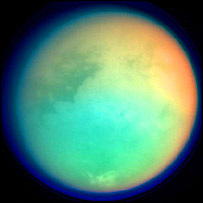 By Paul Rincon
By Paul RinconBBC News science reporter, Houston , Texas
Terrestrial rocks blown into space by asteroid impacts on Earth could have taken life to Saturn's moon Titan, scientists have announced.
Earth microbes in these meteorites could have seeded the organic-rich world with life, scientists believe.
They think the impact on Earth that killed off the dinosaurs could have ejected enough material for some to reach far-off moons like Titan.
Details were unveiled at a major science conference in Houston, US.
The theory of panspermia holds that life on planets like Earth and Mars was seeded from space, perhaps hitching a ride on meteorites and comets.
To get terrestrial, life-bearing rocks to escape the Earth's atmosphere and reach space, an impact by an asteroid or comet between 10 and 50km is required. Only a handful of recorded strikes in geological history fit the bill.
Million-year journey
One of them is the asteroid strike 65 million years ago, which punched a crater between 160 and 240km wide in what is today the Yucatan peninsula, Mexico.
Brett Gladman from the University of British Columbia (UBC) in Vancouver and colleagues calculated that about 600 million fragments from such an impact would escape from Earth into an orbit around the Sun. Some of these would have escape velocities such that they could get to Jupiter and Saturn in roughly a million years.
Using computer models, they plotted the behaviour of these fragments once they were in orbit. From this, they calculated the expected number that would hit certain moons of Jupiter and Saturn.
The principal targets they chose, Titan and Europa, are of considerable interest to astrobiologists, the community of scientists who study the habitability of other planetary bodies.
Titan is rich in organic compounds, which provide a potential energy source for primitive life forms, Europa is thought to harbour a liquid water ocean under its thick crust of ice.
Hitting at speed
Dr Gladman's team calculated that up to 20 terrestrial rocks from a large impact on Earth would reach Titan. These would strike Titan's upper atmosphere at 10-15 km/s. At this velocity, the cruise down to the surface might be comfortable enough for microbes to survive the journey.
But the news was more bleak for Europa. By contrast with the handful that hit Titan, about 100 terrestrial meteoroids hit the icy moon.
But Jupiter's gravity boosts their speed such that they strike Europa's surface at an average 25 km/s, with some hitting at 40 km/s. Dr Gladman said other scientists had investigated the survival of amino acids hitting a planetary surface at this speed and they were "not good".
"It's frustrating if you're a microbe that's been wandering the Universe for a million years to then die striking the surface of Europa," Dr Gladman said.
Asked after his presentation by one scientist whether he thought microbes would be able to survive Titan's freezing temperatures, Dr Gladman answered: "That's for you people to decide, I'm just the pizza delivery boy."
The UBC researcher gave his presentation at the astrobiology session held at the Lunar and Planetary Science Conference in Houston, Texas.
Story from BBC NEWS:
Published: 2006/03/18 09:04:43 GMT
© BBC MMVI
No comments:
Post a Comment